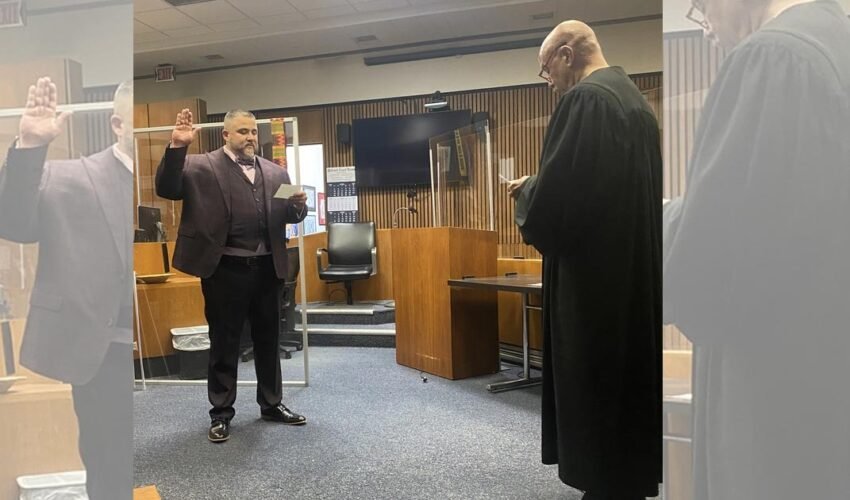Sixteen years after helping a troubled young man, Edward Martell, avoid a lengthy prison sentence for drug dealing, Michigan judge Bruce Morrow swore in the one-time criminal to practice law in the state.

Edward Martell was a 27-year-old high school dropout with a lengthy rap sheet dating back to his early adolescence when he first appeared in Judge Bruce Morrow’s Wayne County Circuit courtroom.
Martell was out on bail when he was arrested in a drug sting in Dearborn Heights, Michigan, just days before his mother’s birthday in 2005. Martell faced up to 20 years in prison after pleading guilty to selling and manufacturing crack cocaine.
Martell returned to Morrow’s courtroom on May 14 in a meeting first reported by Deadline Detroit. Martell was accompanied by two lawyers and his family. He raised his hand as he faced Morrow, dressed in a three-piece suit and bow tie.
“I, Edward Martell, do solemnly swear,” he started.
Martell and Morrow hugged after finishing the oath. The judge was staring at Martell, who had just been sworn in as a member of the Michigan State Bar at the age of 43.
“In the last 15 years, Ed has been in that courtroom at least 50 times,” Morrow told The Washington Post on Tuesday. “And he walked in with the biggest grin on his face that day. He was on the verge of exploding.”
When the two first met in court nearly 16 years ago, the scene was very different.
Anyone looking at Martell’s record could easily conclude that he is a “career criminal.” The justice system had provided him with opportunities to negotiate plea bargains for lesser offenses, but he assumed his luck had run out.
“Any other judge would have flushed me,” Martell said.
Whereas Martell saw himself as a lost cause, Morrow saw a bright – even brilliant – young man who had overcome adversity.
“I can imagine Ed – being a Brown man, coming from a poor family, being chased by cops and put in handcuffs – never thinking this is where the love could come from,” Morrow said of Martell, who is Latino.
Instead of throwing the book at Martell, the judge sentenced him to three years on probation and challenged him to return to court with an accomplishment, such as becoming a corporate executive, the next time.
“It was kind of in jest, but he knew I believed he could be anything he wanted to be,” Morrow explained.
Martell was set in his ways, but he was encouraged and galvanized by Morrow’s faith in him.
For the next 15 years, the two kept in touch on a regular basis, usually speaking at least once every two months as Martell tried to put more distance between the man he was and the man Morrow believed he could be.
The road wasn’t always easy.
He violated probation before serving his three-year sentence. Because of his record, he was discouraged from pursuing law when he mustered the courage to attend community college in 2008.
“At the time, I was just a thief with a dream,” Martel explained. “They suggested that I (study) heating and cooling.”
Martell said he went on to earn academic scholarships from the University of Detroit Mercy for undergrad and law school after graduating with an associate’s degree; he later got a clerkship with the Federal Public Defender for the District of Columbia.
Morrow drove eight hours to Washington, D.C., and met Martell for lunch before returning to Detroit.
Morrow’s nature has always been to see a person’s humanity, even when they are in the worst situation of their lives, according to Sean Perkins, a former partner at the Perkins Law Group in Detroit, where Martell worked as a legal researcher. Perkins is acquainted with both men on a personal and professional level.
“They’re still human beings, and he treats them that way,” Perkins told The Washington Post.
Martell’s resourcefulness impressed Perkins. “Ed, it’s almost as if he can do anything. He’s stepped up to the plate on numerous occasions, and I’m not just talking about once.”
Despite more than a decade of stellar academic performance and a solid work history, Martell’s dream of becoming a lawyer was never guaranteed.
The character and fitness evaluation, the second step in the state bar application process, is what Morrow describes as the ultimate background check, and it is especially stringent in Michigan. It’s often an afterthought for younger applicants with little work or life experience, but given Martell’s criminal record, it could have jeopardized his application.
“The most important quality they seek is candour. I tell them I’m sorry, that I’m embarrassed, and that I’m sorry “Martell spoke about his past. “I am the same person, but I no longer think that way. I’ve changed.”
He submitted a 1,200-page application and was advised by lawyers from the Perkins Law Group and Morrow.
After 15 minutes of deliberation, the character and fitness board approved him.
“My tears began to flow like a baby’s. I’ve been chasing this dream for 13 years with no idea what’s at the end of the tunnel “Martell explained.
On May 14, there were tears again in Marrow’s courtroom, but this time they were happy tears.
Martell was given a monogrammed leather briefcase and an ink pen with his initials by the partners at Perkins, where he would be joining the practice. Martell’s mother read a Bible passage.
Morrow basked in the joy of the day, but he does not take credit for Martell’s success. Both men have a strong faith and credit God for the outcome of their shared story.
Most failures, according to Morrow, occur because people who require assistance do not receive it, adding, “There is no such thing in my mind as a self-made person.”
Read more:











